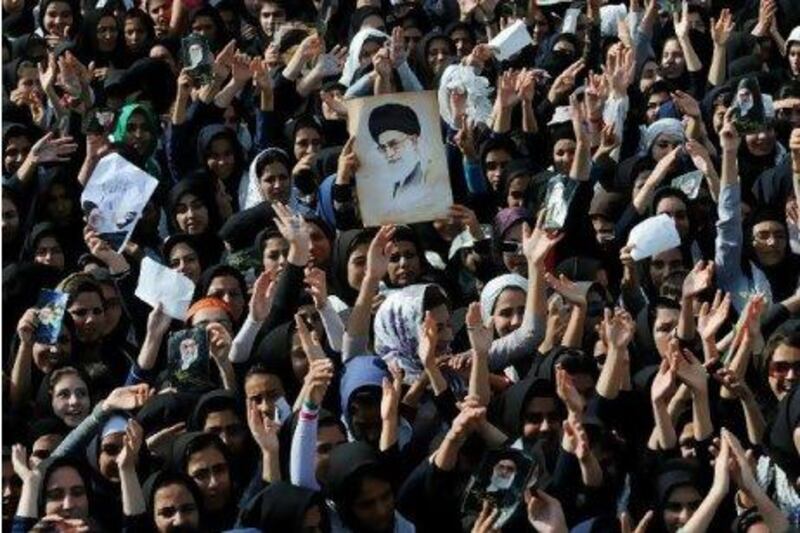Saudi Arabia has asked the UN chief Ban Ki-moon to inform the Security Council of the "heinous conspiracy" to kill its envoy to Washington in an alleged Iranian plot.
"The Saudi permanent mission to the United Nations in New York has ... formally requested the UN secretary general to inform the Security Council of the heinous conspiracy to assassinate the Saudi ambassador," the SPA state news agency said. "All those involved in this odious attempt should face justice."
The United States on Wednesday sought UN Security Council support for action to hold Iran "accountable" for the alleged plot, with Britain and France already strongly on board, according to diplomats.
The US ambassador Susan Rice, joined by the Saudi envoy to the UN, Abdallah Al Mouallimi, held separate meetings with envoys on the 15-nation council, US officials and diplomats said.
Meanwhile, Iran's supreme leader yesterday ridiculed US allegations that Tehran had plotted to assassinate the Saudi diplomat on American soil using a hapless, Iranian-born used car dealer from Texas and a Mexican drug cartel.
In his first direct reaction to the charges, Ayatollah Ali Khamenei, proclaimed: "It's a meaningless and absurd accusation regarding a number of Iranians. But it has not stuck and it will not stick."
US officials acknowledge they do not know which of Iran's leaders, if any, are implicated.
But the US president, Barack Obama, stressed this week that "even if at the highest levels there was not detailed operational knowledge, there has to be accountability with respect to anybody in the Iranian government engaging in this kind of activity."
Aware that many in the international community are sceptical of the US claims, Washington has dispatched envoys to several countries, including Russia, China and Turkey, to provide more details about the plot.
Alluding indirectly to the accusations in recent days, the ayatollah suggested the US had fabricated the seemingly outlandish plot to distract attention from the "Wall Street uprising", to promote "Iranophobia" and to foment strife between Shiites and Sunnis.
Addressing a crowd in the city of Gilangharb, Mr Khamenei said yesterday: "They say [the US] that they want to isolate Iran. They are the ones who are isolated." The US was the "most hated" country in the world, despised in the region and "even Europe".
Amid the mutual recriminations, however, it appears Iran and the US are keeping channels open that could help defuse the row.
Washington insists it had rare direct contacts with Iranian officials over the allegations in which it warned the Iranian regime would be held to account. Tehran, unsurprisingly, denied any such meetings.
"But it appears that beyond the public rhetoric, Iran is open to quiet discussion over the plot allegations," said Scott Lucas, an Iran expert at Birmingham University in England.
Analysts also noted that since the US unveiled the charges on Tuesday, Iran has stopped issuing statements of its military prowess that were prominent in preceding days.
And, unusually, Iran's firebrand and habitually outspoken president, Mahmoud Ahmadinejad, has been silent on the issue. US officials are said to believe he knew nothing of the alleged plot they say was engineered by Iran's shadowy Quds military force, which is answerable only to Mr Khamenei.
"It looks like the Iranians are being cautious while they try to establish what happened," Mr Lucas said in a telephone interview.
The US has accused an Iranian-American now in custody, Manssor Arbabsiar, and Golam Shakuri, a reputed member the Quds Force who is in Iran, of conspiring to murder the Saudi ambassador in Washington, Adel Al Jubeir.
Mr Arbabsiar, a former used car salesman, is accused of attempting to enlist a Mexican drugs cartel to carry out the hit in a Washington restaurant popular with the Saudi diplomat as well a host of American power players. Neighbours and friends of Mr Arbabsiar, in Texas, expressed incredulity that a man they knew as Jack, because of his fondness for Jack Daniels whisky, could be an Iranian hit man.
They portrayed him as a well-meaning but shambolic failed businessman who could not keep a secret.
If the US was "looking for 007, they got Mr Bean," one of his former business partners, David Tomscha, told reporters. Al Jazeera said yesterday it had learnt that Mr Arbabsiar, 56, was not at all religious.
The US government is trying to rally international support for sanctions against the Central Bank of Iran, Bank Markazi.
Iran's foreign ministry spokesman, Ramin Mehmanparast, claimed yesterday that the relationship between his country and Saudi Arabia was based on "mutual respect" and could not be harmed by America's "comical and baseless" allegations.
The Iranian foreign minister, Ali Akbar Salehi, said the "Israel lobby played a key role" in convincing Washington to make the "baseless" accusations.
He said the Saudis were "too wise to get involved in this political game", adding: "We hope they will deal with this issue with caution".
The influential former chief of Saudi intelligence services has promised revenge against Iran. Prince Turki Al Faisal said on Tuesday the US evidence of the plot was "overwhelming" and "clearly shows official Iranian responsibility."






